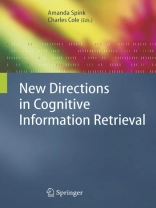New Directions in Cognitive Information Retrieval presents an exciting new direction for research into cognitive oriented information retrieval (IR) research, a direction based on an analysis of the user’s problem situation and cognitive behavior when using the IR system. This contrasts with the current dominant IR research paradigm which concentrates on improving IR system matching performance.
The chapters describe the leading edge concepts and models of cognitive IR that explore the nexus between human cognition, information and the social conditions that drive humans to seek information using IR systems. Chapter topics include: Polyrepresentation, cognitive overlap and the boomerang effect, Multitasking while conducting the search, Knowledge Diagram Visualizations of the topic space to facilitate user assimilation of information, Task, relevance, selection state, knowledge need and knowledge behavior, search training built into the search, children’s collaboration for school projects, and other cognitive perspectives on IR concepts and issues.
Table des matières
Introduction: New Directions in Cognitive Information Retrieval.- CIR Concepts.- Interactive Information Retrieval: Bringing the User to a Selection State.- Cognitive Overlaps along the Polyrepresentation Continuum.- Integration Approaches to Relevance.- New Cognitive Directions.- CIR Processes.- A Multitasking Framework for Cognitive Information Retrieval.- Explanation in Information Seeking and Retrieval.- Towards an Alternative Information Retrieval System for Children.- CIR Techniques.- Implicit Feedback: Using Behavior to Infer Relevance.- Educational Knowledge Domain Visualizations: Tools to Navigate, Understand, and Internalize the Structure of Scholarly Knowledge and Expertise.- Learning and Training to Search.- Conclusions.- Conclusion and Further Research.












